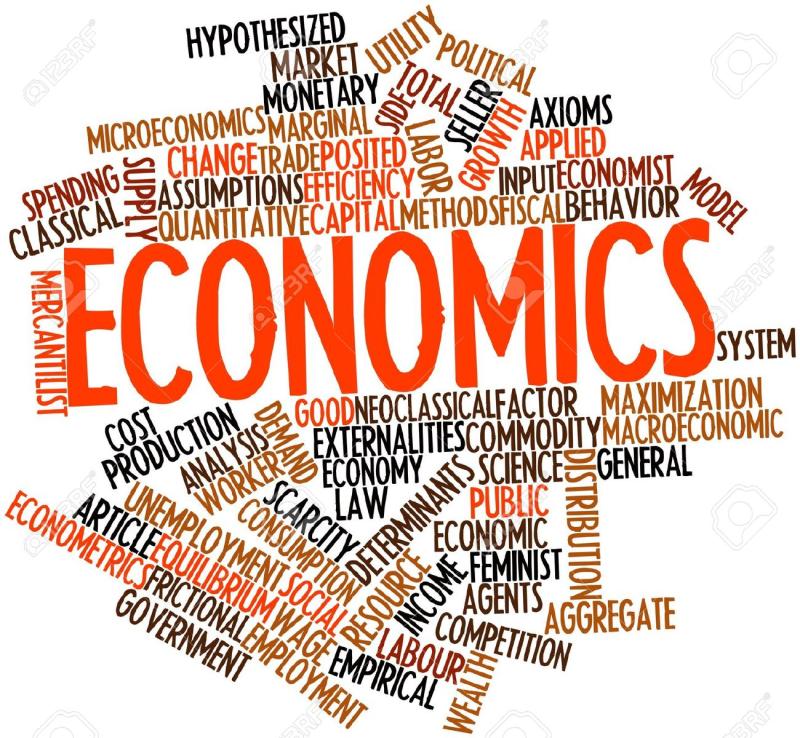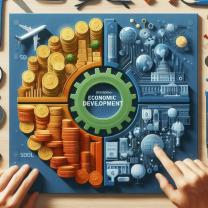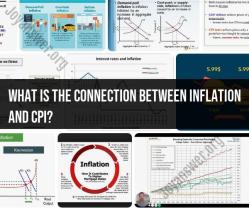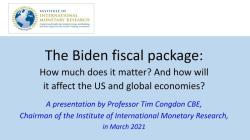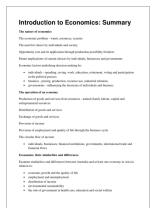What are the basic economic concepts?
<div class="markdown prose w-full break-words dark:prose-invert light"><p>Basic economic concepts form the foundation of understanding how economies function. Here are some fundamental principles and concepts in economics:</p><ol><li><p><strong>Scarcity:</strong></p><ul><li>Scarcity is the fundamental economic problem that arises because resources (such as time, money, and natural resources) are limited, while human wants and needs are virtually unlimited.</li></ul></li><li><p><strong>Choice and Opportunity Cost:</strong></p><ul><li>Individuals and societies must make choices because resources are scarce. The opportunity cost is the value of the next best alternative that must be forgone when a choice is made.</li></ul></li><li><p><strong>Supply and Demand:</strong></p><ul><li>The law of demand states that, all else being equal, as the price of a good or service decreases, the quantity demanded increases, and vice versa. The law of supply states that, all else being equal, as the price of a good or service increases, the quantity supplied increases, and vice versa.</li></ul></li><li><p><strong>Equilibrium:</strong></p><ul><li>Equilibrium is the point where the quantity demanded equals the quantity supplied in a market, determining the market price and quantity.</li></ul></li><li><p><strong>Marginal Analysis:</strong></p><ul><li>Economists often analyze decisions at the margin, considering the additional or marginal benefit of an action compared to its additional or marginal cost.</li></ul></li><li><p><strong>Factors of Production:</strong></p><ul><li>Resources used in the production of goods and services are classified into:<ul><li>Land (natural resources),</li><li>Labor (human effort and skills),</li><li>Capital (physical and human capital), and</li><li>Entrepreneurship (innovation and organization).</li></ul></li></ul></li><li><p><strong>Gross Domestic Product (GDP):</strong></p><ul><li>GDP is the total value of goods and services produced within a country's borders over a specific period. It is a key indicator of a nation's economic health.</li></ul></li><li><p><strong>Inflation and Deflation:</strong></p><ul><li>Inflation is the increase in the general price level of goods and services over time, while deflation is the opposite—a decrease in prices.</li></ul></li><li><p><strong>Trade and Comparative Advantage:</strong></p><ul><li>Comparative advantage is the ability of a country, individual, or company to produce a good or service at a lower opportunity cost than its competitors, leading to specialization and trade.</li></ul></li><li><p><strong>Economic Systems:</strong></p><ul><li>Economic systems define how a society organizes and allocates its resources. Common types include market economies, command (planned) economies, and mixed economies.</li></ul></li><li><p><strong>Circular Flow of Income:</strong></p><ul><li>The circular flow model illustrates the flow of goods, services, and money between households and businesses in an economy.</li></ul></li><li><p><strong>Utility and Marginal Utility:</strong></p><ul><li>Utility refers to the satisfaction or happiness derived from consuming a good or service, while marginal utility is the additional satisfaction gained from consuming one more unit.</li></ul></li></ol><p>These basic economic concepts provide a framework for understanding more complex economic theories and analyses. They are essential for anyone seeking to grasp the fundamentals of how economies operate and how individuals and societies make choices in the face of scarcity.</p></div>Basic economic concepts form the foundation of understanding how economies function. Here are some fundamental principles and concepts in economics:
Scarcity:
- Scarcity is the fundamental economic problem that arises because resources (such as time, money, and natural resources) are limited, while human wants and needs are virtually unlimited.
Choice and Opportunity Cost:
- Individuals and societies must make choices because resources are scarce. The opportunity cost is the value of the next best alternative that must be forgone when a choice is made.
Supply and Demand:
- The law of demand states that, all else being equal, as the price of a good or service decreases, the quantity demanded increases, and vice versa. The law of supply states that, all else being equal, as the price of a good or service increases, the quantity supplied increases, and vice versa.
Equilibrium:
- Equilibrium is the point where the quantity demanded equals the quantity supplied in a market, determining the market price and quantity.
Marginal Analysis:
- Economists often analyze decisions at the margin, considering the additional or marginal benefit of an action compared to its additional or marginal cost.
Factors of Production:
- Resources used in the production of goods and services are classified into:
- Land (natural resources),
- Labor (human effort and skills),
- Capital (physical and human capital), and
- Entrepreneurship (innovation and organization).
- Resources used in the production of goods and services are classified into:
Gross Domestic Product (GDP):
- GDP is the total value of goods and services produced within a country's borders over a specific period. It is a key indicator of a nation's economic health.
Inflation and Deflation:
- Inflation is the increase in the general price level of goods and services over time, while deflation is the opposite—a decrease in prices.
Trade and Comparative Advantage:
- Comparative advantage is the ability of a country, individual, or company to produce a good or service at a lower opportunity cost than its competitors, leading to specialization and trade.
Economic Systems:
- Economic systems define how a society organizes and allocates its resources. Common types include market economies, command (planned) economies, and mixed economies.
Circular Flow of Income:
- The circular flow model illustrates the flow of goods, services, and money between households and businesses in an economy.
Utility and Marginal Utility:
- Utility refers to the satisfaction or happiness derived from consuming a good or service, while marginal utility is the additional satisfaction gained from consuming one more unit.
These basic economic concepts provide a framework for understanding more complex economic theories and analyses. They are essential for anyone seeking to grasp the fundamentals of how economies operate and how individuals and societies make choices in the face of scarcity.
What are the foundational principles constituting basic economic concepts?
The field of economics rests on several foundational principles that form the building blocks for understanding its key concepts. Here are some of the most crucial ones:
1. Scarcity and Choice: Humans have unlimited wants and desires, but resources are limited. This fundamental dilemma forces individuals and societies to make choices about how to allocate these limited resources to fulfill their wants. These choices involve trade-offs, as choosing one option requires forgoing another.
2. Rational Choice and Utility: Individuals are assumed to act rationally, seeking to maximize their own utility (satisfaction or well-being) with the resources available. This principle helps explain how individuals make decisions about consumption, production, and investment.
3. Supply and Demand: The interaction between supply (the amount of a good or service producers are willing and able to sell at different prices) and demand (the amount of a good or service consumers are willing and able to buy at different prices) determines the market price. This principle explains how prices are determined and how they allocate resources in markets.
4. Marginal Utility: The additional utility (satisfaction) gained from consuming one more unit of a good or service. This principle suggests that as individuals consume more of a good, the additional satisfaction they get from each additional unit decreases. This influences consumption patterns and pricing strategies.
5. Incentives and Opportunity Cost: Individuals respond to incentives, such as prices, taxes, and subsidies, which influence their choices. The opportunity cost of a choice is the benefit forgone by choosing one option over another. Understanding opportunity costs helps individuals and policymakers make efficient decisions.
6. Efficiency and Trade: Efficiency refers to a state where resources are allocated to their most productive uses. Trade allows individuals and societies to specialize in production and exchange goods and services, potentially leading to increased efficiency and overall well-being.
7. Institutions and Property Rights: Institutions, such as legal systems and markets, define the rules of the game in an economy. Property rights define ownership of resources and influence how resources are used. Strong institutions and well-defined property rights are essential for efficient economic functioning.
8. Competition and Market Structure: Different market structures (monopoly, oligopoly, perfect competition) influence how firms interact, set prices, and allocate resources. Understanding competition is crucial for analyzing market outcomes and potential interventions.
9. Economic Growth and Development: Economic growth refers to increases in a country's real GDP over time, while development encompasses broader improvements in well-being, including poverty reduction and inequality. Understanding the factors driving these phenomena is key for formulating economic policies and promoting prosperity.
10. Macroeconomic Factors: Macroeconomics focuses on aggregate variables like inflation, unemployment, and national output. Understanding these factors and their interactions is crucial for analyzing the overall performance of an economy and designing effective macroeconomic policies.
These principles provide a foundational framework for understanding basic economic concepts, but remember that economics is a vast and complex field. Further exploration of specific concepts and theories allows for a deeper understanding of economic phenomena and the intricacies of human behavior within economic systems.
I hope this explanation is helpful! Feel free to ask any further questions you may have about these principles or other aspects of economics.
